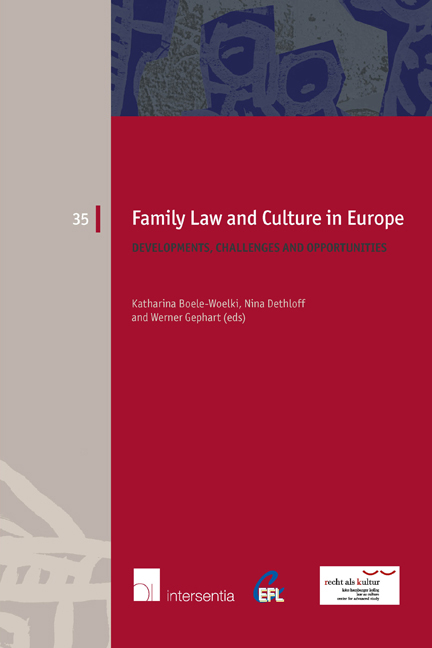Book contents
- Frontmatter
- Preface
- Contents
- List of Authors
- PART ONE THE CEFL PRINCIPLES ON PROPERTY RELATIONS BETWEEN SPOUSES
- PART TWO BREAKUP OF (NON-)FORMALISED RELATIONSHIPS
- PART THREE NEW CONCEPTS OF PARENTAGE
- PART FOUR INTERNATIONAL FAMILY RELATIONSHIPS
- PART FIVE TRANSNATIONAL FAMILIES: ACROSS NATIONS AND CULTURES
- Family Life and EU Citizenship: The Discovery of the Substance of the EU Citizen's Rights and its Genuine Enjoyment
- Private and Family Life versus Morals and Tradition in the Case Law of the ECtHR
- Real-Life International Family Law: Belgian Empirical Research on Cross-Border Family Law
- Transnational Family Relations Involving Moroccan Nationals Living Abroad: An Analysis of the Implementation of the Moroccan Family Code Brief report on research in progress
- Family Law as Culture
- EUROPEAN FAMILY LAW SERIES
Private and Family Life versus Morals and Tradition in the Case Law of the ECtHR
from PART FIVE - TRANSNATIONAL FAMILIES: ACROSS NATIONS AND CULTURES
Published online by Cambridge University Press: 22 November 2017
- Frontmatter
- Preface
- Contents
- List of Authors
- PART ONE THE CEFL PRINCIPLES ON PROPERTY RELATIONS BETWEEN SPOUSES
- PART TWO BREAKUP OF (NON-)FORMALISED RELATIONSHIPS
- PART THREE NEW CONCEPTS OF PARENTAGE
- PART FOUR INTERNATIONAL FAMILY RELATIONSHIPS
- PART FIVE TRANSNATIONAL FAMILIES: ACROSS NATIONS AND CULTURES
- Family Life and EU Citizenship: The Discovery of the Substance of the EU Citizen's Rights and its Genuine Enjoyment
- Private and Family Life versus Morals and Tradition in the Case Law of the ECtHR
- Real-Life International Family Law: Belgian Empirical Research on Cross-Border Family Law
- Transnational Family Relations Involving Moroccan Nationals Living Abroad: An Analysis of the Implementation of the Moroccan Family Code Brief report on research in progress
- Family Law as Culture
- EUROPEAN FAMILY LAW SERIES
Summary
INTRODUCTION
For approximately thirty years now, the European Court has constantly been reshaping the relations between individuals, the family and the State. On the one hand, the autonomous concepts of private life and family life have been given a totally unexpected width. On the other hand, the obligations imposed on States in this ever-enlarging field have also become heavier. Article 8 requires States not only to abstain from undue interferences, but also to protect individuals from each other and to adopt positive measures designed to ensure the effectiveness of rights.
However, the rights guaranteed by the Convention may suffer restrictions on different grounds. The second paragraph of Article 8 of the Convention foresees that States may limit individual rights in order to pursue different legitimate aims such as the security or the economic well-being of the country, the protection of the rights and freedoms of others or the protection of morals. The pattern of justifications imposed on States regarding actions and abstentions in the ambit of personal and family life is evolving: at first sight, one could think that morals and traditions are much less efficient today than they used to be in the early case law of the Court. If this would be consistent with the contemporary favour for ‘liberal pluralism’, recent decisions suggest that the Court is still ready to uphold national solutions inspired by ‘legal moralism’.
This contribution studies, firstly, how moral and traditional views seemed to have been progressively delegitimised as justifications for restrictions to personal autonomy and equality between people and family forms (section 2) and, secondly, how, for a couple of years, majoritarian conceptions of morality appear reinvested with considerable weight while traditional views on family relations are treated in a schizophrenic way by the European judges (section 3).
FROM A DELEGITIMISATION OF MORALS AND TRADITION AS JUSTIFICATIONS FOR RESTRICTIONS ON RIGHTS
The protection of morals has oft en been invoked by States trying to justify restrictions on individual freedom in sexuality-related matters (section 2.1). The protection of the traditional family has rather been advanced as an argument justifying the differentiated treatment of unconventional families and inequalities between men and women (section 2.2).
- Type
- Chapter
- Information
- Family Law and Culture in EuropeDevelopments, Challenges and Opportunities, pp. 305 - 322Publisher: IntersentiaPrint publication year: 2014



